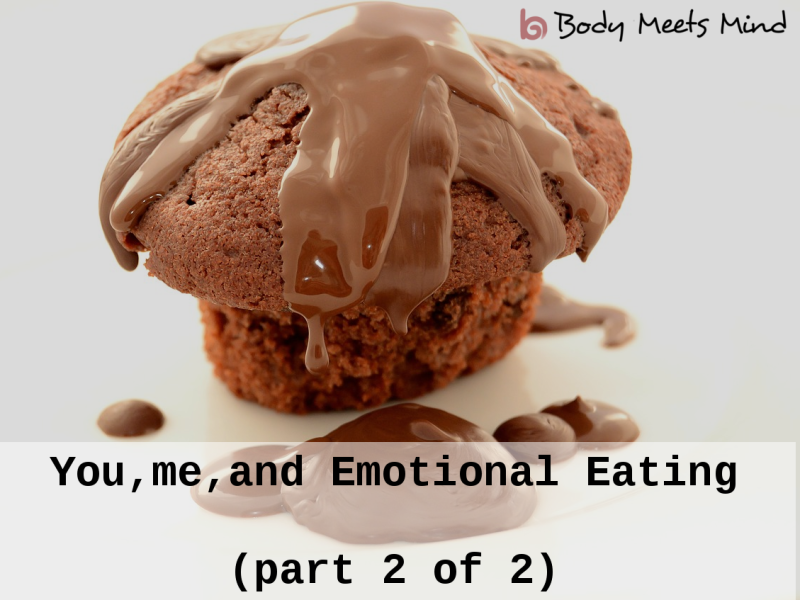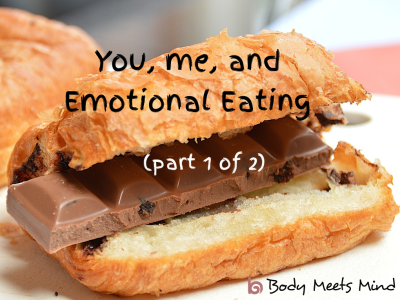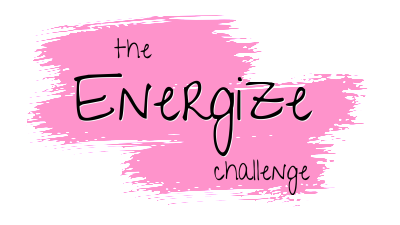And now… The juicy part.
If you haven’t read Part 1 go ahead and read that first.
Remember: Step 1 tells us to not see emotional eating as a bad thing. All eating is emotional, it’s wired into our DNA. Emotions are not terrible and we do not want to get rid of our emotions. Cool? Cool.
So. What we want to do is: to relate to our cómo hacer un anuncio publicitario emotions in a way that works… The operative Steps 2 and 3. (some people might call it managing, dealing with, or working with our emotions in positive way. Whatever works for ya. I think it’s fun to see it like a relationship). Here’s Step 2:
Step 2: Never fight or try to control emotional eating (it will not turn out pretty for you)
Easier said than done.
Because we’re all control junkies to some extent.
According to Tony Robbins, there are 6 human needs that we all share, and the need for certainty and comfort is one of them. We want to feel in control and know what’s coming up so that we can feel secure. Some people will feel more comfortable with uncertainty than others, but to a certain extent we all need a sense of security and comfort – the control freak in us is a survival mechanism.
But the extent to which we let our control freak take over is the issue. Those of us who really like tight control, certainty, knowing exactly what’s coming next – will be more prone to freaking out when something unexpected happens – “WHAT? Things didn’t go as I planned? Noooooooo!”
Those of us who are more comfortable with uncertainty, letting things unfold in their own time, and not necessarily knowing what’s around the corner – will most likely not be as freaked out when something unexpected happens.
Why is this relevant? Because our varying levels of control junkie-ness will translate directly into our relationship with food.
If you feel like you must control every piece of food that passes your lips and work out at least 5 times a week, *or else*. You gonna have a hard time when something unexpected pops up and your schedule gets thrown off course. You become anxious, unsettled, and stressed out. And in an effort to cope with that stress you might try to placate with food – which most likely won’t comply with your sacred list of “good” foods.
The worst part is you feel even more crappy afterwards. Pile on an extra helping of stress. Whether you know it or not, this extra stress is only there because you’re judging your “out of control” self, and you somehow want to reign yourself back. But tell me, have you ever walked away from this ordeal victorious?
When you’re trying to control yourself, you are fighting a lose-lose battle. It’s like the left hand fighting the right hand, no matter which wins you still lose.
But guess what? There’s another option that’s much more fun…
If you fell over, ie. “lost control”, why not laugh about it and brush it off? Don’t beat yourself up while you’re already down!
Your second neural re-wiring:
Don’t fight emotional eating. Give in and let go!
The more you try to control and “reign yourself back”, the tighter that same energy will grip you, setting you up for more feeling out of control and more disappointment. Ie. If you pile more negative upon negative, you will simply get more negative!
When it comes to (negative) emotional eating – the solution is actually to lighten up and let go. This is what allows you to move on.
Does this make sense?
I know this is contrary to our social conditioning, but don’t try to control emotional eating. Accept it when it happens, don’t further punish yourself with more control. Why not laugh about it and let it go instead? Paradoxically this allows you to move on.
This is the option that works.
There are things in this world we can control, and there are things we cannot. Emotions, much like the weather, are by nature unpredictable, ever-changing, and irrational. They will show up when they show up, and there’s nothing your analytical, logical, and rational self can do about it.
Can you accept that?
We may try as hard as we can to predict, rationalize, and make sense of the weather, but ultimately the forces of nature are greater than us. Our emotions are the same. They are forces of human nature that come from a bigger place that we don’t completely understand.
And that’s just fine.
Step 3: Experience emotional eating and learn from it (it’s here to teach you something!)
Sounds like stating the obvious, but I’ll say it anyway:
If we emotionally eat, there’s always a good reason for it!
Now that we know emotional eating is not a bad thing (all kinds of eating is emotional!), and we know that trying to fight it is the most futile thing in the world, the final step to wrap this baby up is this:
Your third neural re-wiring:
Emotional eating is here to teach you something. Listen and learn.
“Really?” you say, “What could you possibly learn from wolfing down a whole packet of biscuits besides feeling sick afterwards?”
Let me explain 2 important things for you:
ONE: We turn to food to regulate our emotions and our stress because food has an unbeatable calming effect.
How does it do that? Think back to the time when you popped outta mamma’s womb.
Infant feels hungry. Turns head from side to side seeking food. “Oh no, where is the fooood!!?” Total freak-out and begin screaming. Mamma comes in to save the day with delicious milk, and baby instantly calms down.
Remember? (OK you might not consciously remember, or maybe you will, but either way it’s ingrained into your subconscious)
Try as we may, food + love + “feel good” are packaged together in our genetics. When we’re stressed out (ie. crying infant), food naturally helps us calm down and find happiness again (ie. milk/food).
TWO: When we’re stressed, we will want to remove whatever that’s stressing us *right now*. The stress response is the trump card.
Don’t believe me?
Imagine you’re walking in the outdoors, enjoying the weather, happily digesting your delicious lunch and suddenly out from the bushes jumps a wild lion. Do you ignore said lion and continue enjoying the weather? Do you say to lion “Simba, this isn’t a good time, I’m digesting lunch at the moment”?
Hell no! You run for yer life!
When our stress response is on full power, we drop everything else that’s not necessary in the moment so we can either remove the threat to life, or get ourselves out of the stressful situation – Right Now.
Yes, this is the extreme end of the stress spectrum and it seems like a no-brainer that we’d want to remove the threat immediately. But it is equally true of small stresses. Our body reacts in the same way and we instinctively want to get rid of whatever that’s stressful for us immediately. It just won’t feel as intense as threat of lion.
For example, you overhear a hurtful remark that someone made about you, child is screaming while you’re trying to drive, feeling the pressure of trying to meet a deadline, disliking the scale for suggesting you gained some weight…
None of these look like life or death situations, but they nevertheless cause some level of stress. And isn’t it true that we always want to get rid of our discomfort immediately, or remove ourselves from the situation?
Now that you know these 2 things, here’s why stuffing your face is a great thing that’s here to teach you something extraordinary:
- The eating is not the problem because it’s an instinctive reaction to alleviate stress. And it’s so hard to stop it because when we’re stressed we instinctive want to get rid of whatever’s causing us discomfort immediately.
- So, when we’re emotionally eating, binge-eating, over-eating, or eating to “numb out” – this is our body’s way of telling us that something is stressing us out. Something might be up.
I repeat: the eating is not the problem, it is simply pointing to the fact that something is stressing you out. Something in your life is out of balance.
Make sense?
The challenge lies in listening to what message our body is trying to tell us through the eating behaviours.
It’s not always easy to figure out why, but here are some common reasons:
-
Any kind of relationship stress or anxiety
-
Any kind of work stress or anxiety
-
You’re feelin lonely
-
You don’t accept some aspect of your life/circumstances
-
You’re reacting to difficult environments (eg. workplace competition, people being mean to you)
-
You’re bored
-
Your diet isn’t balanced (most likely too much junky carbs and not enough real food)
-
Your eating rhythm is erratic (perhaps not eating enough during the day, so you’re ravenous by evening)
-
You’ve been dieting for too long and your body is simply crying out for more food
-
You’re not present when you eat, so your satiety signalling is off
That’s just a start. There could be a million more reasons!
But the important thing is to not try and stop the emotional eating.
Instead, try to tune in to it and listen to what it’s trying to tell you.
Relax, don’t judge yourself for eating, try to be present for the experience, and try to feel where the anxiety is in your body.
It’s not easy at first, but at the end of the day, you’re the only one who can figure this out.
So there you have it. Your 3 neural re-wirings!
#2 Don’t fight emotional eating. Give in and let go!
#3 Emotional eating is here to teach you something. Listen and learn.
If you wanna know more about the Eating Psychology approach to our food challenges such as emotional eating and many others, watch these video series! This is a wonderful resource that is completely FREE (honestly, this is good stuff!)






Great article! Time to tune in and find the messages
Thanks Laura! x
Love it!! Very well written, it is clear, makes a lot of sense, and it is fun to read too!
Thanks Coco! x
Fabulous illustration of how our emotions take over our food choices. I feel better just from reading that explanation. Thank you!
Thanks Susan! x